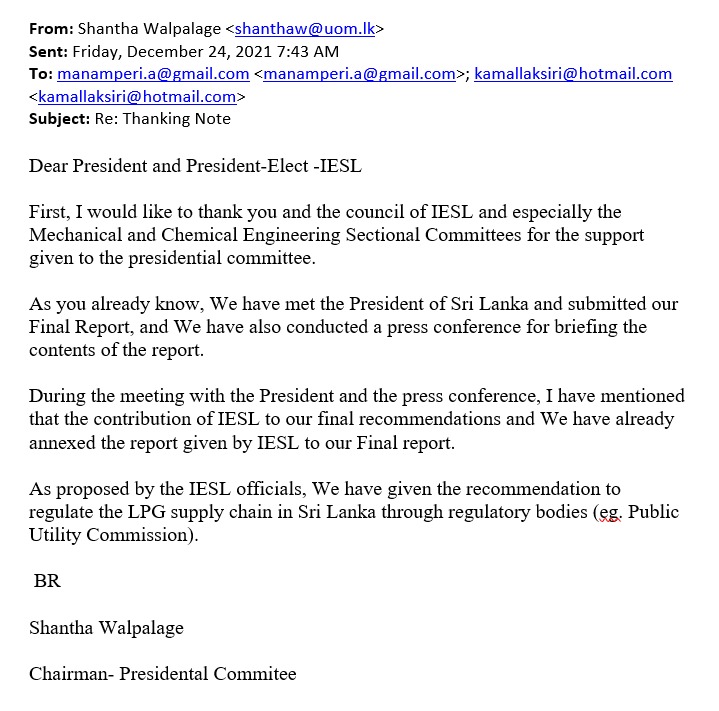CONTRIBUTION OF IESL IN RESOLVING THE PROBLEMS OF LIQUID PETROLIUM GAS LEAKAGES AND RECOMANDATION OF ROADMAP TO PREVENT LP GAS RELATED EXPLOSIONS IN FUTURE
By MESC and CPESC

Sri Lanka is identified as one of the fastest urbanizing countries in south Asia. The fast urbanization in the country had increased the dependence on imported Liquid Petroleum Gas (LPG) for domestic cooking for the majority of families living in cities due to practical difficulty in using traditional wood stoves inside confined house space and also for convenience. As per the very recent survey conducted by the Sustainable Energy Authority, approximately 55% of Sri Lankan households use LPG as their primary source of fuel in cooking. However, the country experienced an unprecedented level of LP gas related accidents from household LP gas systems from October 2021, and terrified the whole population, questioning the safety protocols available in LP Gas cylinders and connected accessories.
The initial investigation revealed that two Liquid Petroleum (LP) gas distribution companies in operation in the country, had changed the composition of the constituents of LP Gas (Propane & Butane) without conducting a highly essential detailed survey of possible risk that could transmit to the consumer due to the change of composition of constituents in LP Gas. The LP gas distribution Companies had perhaps targeted merely the financial advantage, they could obtain by this gas composition alteration process and the initial trial was conducted in June 2021. The trial had continued as the business norm from June 2021, since no incidents surfaced initially, during the rainy season of the year. However, the change has proven to be fatal, as the country experienced more sunshine in the latter part of the year, with increased ambient temperatures, reporting more than a thousand LP gas related accidents, including serious burns and death of one person due to severe burning.
IESL being the apex body in safeguarding the principles of practicing engineering in the country had decided to form a competent committee to investigate the causes of these accidents and provide immediate recommendations for restoring the safety in the use of LP gas in households. The appointed Committee was also given the responsibility of providing a roadmap for regulation of LP gas industry in Sri Lanka in the future for safe use even by the domestic consumers who have low technical understanding.
Mechanical Engineering Sectional Committee under the guidance of Chairman Eng. Thimira Godakumbura and the Chemical and Processing Engineering Sectional committee under the guidance of Chairman Eng. Niel Wickramasinghe had conducted a series of meetings to find out true evidence, relating to lack of compliance or circumventing of national standards, lapses in quality control practices, technical limitations in LP gas cylinders and associated accessories in determining the exact causes of failures in the domestic LP Gas system.
The findings of the IESL committee were summarized and presented to the committee appointed by the President, as the first document and subsequently, the second documentation containing the list of recommendations on how to regulate the LP Gas industry in Sri Lanka were handed over to the committee as a supplement to safeguard the general public in future.
Presidential Committee led by Prof. Shantha Walpola had highly appreciated the findings and recommendation of IESL team that helped them in concluding their findings. They have further notified us that the two documents given by IESL in this relation has been annexed in full to the main report given to the President Gotabaya Rajapaksha.
Mechanical Engineering Sectional Committee (MESC)
- Eng. Thimira S. Godakumbura – Chairman (MESC)
- Eng. Parakrama Jayasinghe,
- Eng. Ruwan Nagahawatta
Chemical Processing Engineering Sectional Committee (CPESC)
- Eng. Neil Wickramasinghe – Chairman (CPESC)
- Eng. Chanaka Mahawatta
Chairman of the Presidential Committee, Prof. Shantha Walpalage thanked the IESL team with a note of appreciation of their findings and contribution in solving the national issue.

Following is the report prepared by IESL team.
Following is the supplement to the IESL team prepared report.





-100.jpg)
-100.jpg)